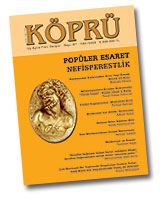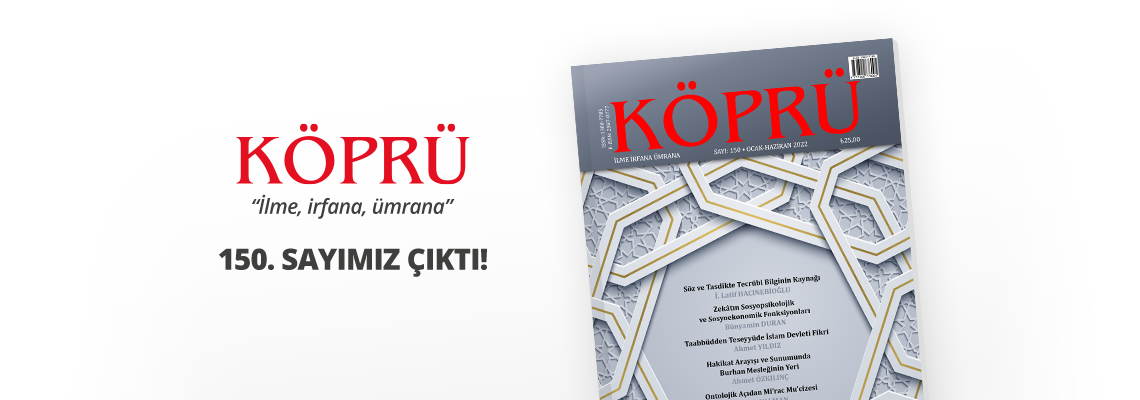Köprü Anasayfa

Popüler Esaret: Nefisperestlik
"Yaz 2004" 87. Sayı
-
Popular Slavery: Sensuality
Editor
Sokrat argues that "life without interrogation is not worth to be experienced". Human being is looking for answers for following questions while questioning the meaning of his existence. "Who am I? From where do I come to this world and why? What is the meaning and goal of my life?" The essential aim of the philosophical and religious belief is to find answers for these questions and thus to provide happiness for the humanity.
The new age in which the individual brings his body and desires at the center of his life compels us for a life without interrogation. The popular culture carried over by the mass media a network brings human being away forms his ideals. As in the case of Bediüzzaman's proposal that "if there would not be any goal of life than the minds would transform into selves", when the human being becomes away from his ideals/interrogations then he puts at the center his bodily desires. As a result, this man living in accordance with his desires makes his "self and sources of desires" idols and can sacrifice everything -even his feelings- in order to fulfill his desires. Also, he sees every impediment as enemy. This attitude is a reflection of the misuse of "the libidinal force" which is from one of the three basic determinant forces over the human behaviors. After that time he is flowing through the valleys of error and the main issues in his mind become to be issues such as richness, power, fame, success, beauty and sexuality. If the man who makes these issues as the main goal of his life can not reach his aim then he deals with many psychological problems. According to the researches, one third of the women and two fifth of the man population is dealint with the problem of depression. This shows us that the main source of the problem is on individual.
From this point on, we define our subject for the dossier as "Popular Slavery: Sensuality". We try to explain the issue around some key concepts such as "id, egocentricism, conformity, hedonism, sensuality, egoism, narcissism, depression and success obsession".
Mustafa Ulusoy, in his article of "The Construction of a Desire from the Ashes of Narcissism: The Relationship Between the Identity and the Desire" explains about the systematic of thought which is not based on revelation is not a rationalist one, it only uses the reason as an instrument of the desires. The author tries to show that the desire is not in work only to satisfy bodily feelings, but it might also show itself with its cognitive aspect.
Yusuf Özkan Özburun, compares in his article the concept of "Super Man" of Nietzsche who based his philosophy upon the Ancient Greek, Pagan Rome and Eastern mysticism and presents this concept for the modern Western world with the concept of "Excellent Man" which is both the cause and result of the Islamic civilization. Özburun, claims that the ultimate goal of the creation is not to rule over the world but to be able to get the will of God. The "excellent man" is a man of equilibrium and it is emphasized as a sample model which defines the standards of the humanness because of the fact that the names and attributes of God are reflected upon the personality of "Excellent Man".
Furkan Aydıner, compares the ideas of Bediüzzaman Said Nursi with the ideas of Jeremy Bentham who was one of the great thinkers of the capitalist system and founders of the pragmatism around the concepts of pleasure and pain. According to Bentham, the "ultimate and unique" aim of the life is maximizing pleasures of individuals and societies and minimizing pains. But Nursi criticizes the hedonism strongly. According to him, the humanity can only accomplish the happiness when it understands the human being with all of the spiritual and bodily feelings and then satisfies them within the legitimate boundaries.
Nevzat Tarhan, claims that the modernity promotes the human prototype which was not virtuous but pragmatic, which prioritizes his happiness rather than other's happiness, which does not consider abstract tastes but concrete tastes as important. Tarhan, concludes his article in which he analyzes the narcissistic psychological stance and the characteristic of narcissist personality by listing the points during a possible interaction with such persons.
Sadık Yalsızuçanlar, reaches the conclusion of the man who knows the richness of his soul and the "self" as a trust can know also his God in his article which he wrote around the hadith of Who knows his Real Self knows his God. According the author, human being can only knows himself according to the level of the Names of God which are reflected in his self.
Yasemin Yaşar, argues in her article of "Civilization and Slavery" that the freedom which is intrinsic in the definition of liberty is completely different from the freedom that is understood by our contemporary men. The author suggests that people as trying to be free in the traps of this dissipated civilization fall into the misery and became slaves to their own selves.
A. Said Yargıcı, lists the reasons of the sensuality (1) to prefer the temporary taste, (2) to be deceived by the temporary life of this world, (3) making the resemblance to the God as the main aim of his life. As a cure, he proposes to be enemy to the self, but after it became satisfied, we should be compassionate against the self.
Reha Fırat, writes about the nationalism which is to be a social reflection of narcissism. He bases the nationalism on the selfishness and belligerence which are deep in the individual psychology.
S. Bahaddin Yaşar, analyzes the book of Telbîs-i İblîs (Devil's Enticement) by İbnü'l-Cevzî. This book enables us to compare the Islamic society in the twelfth century with our contemporary society.
There are also two articles except those in dossier. The first one is by Prof. Dr. Yasien Mohamed from South Africa, the article entitled as "The Pathways to Tolerance in a Multi-Madhhab Society: Faith and Forgiveness in the Thought of Said Nursi". The second one is English translation of the article by Nuri Çakır published in or 84th issue, "The Method of the Headscarf Defense and Proofs for Justness". We hope that this translation will be beneficial during the period of the internationalization of the headscarf debate.
***
As we gave up the word and invite you to the content of our periodical, we hope to meet you again with our 88th issue in which the dossier subject will be "Poverty".
-
Popüler Esaret: Nefisperestlik
Editör
Yazıyı okumak için tıklayınız... -
Popular Slavery: Sensuality
Editor
Yazıyı okumak için tıklayınız... -
Narsisizmin Küllerinden Arzu İnşa Etmek: Benlik ve Arzu İlişkisi1
Mustafa Ulusoy
Yazıyı okumak için tıklayınız... -
Medeniyetlerin Kırılma Noktasında "Üstün İnsan" "Kamil İnsan"a Karşı
Yusuf Özkan Özburun
Yazıyı okumak için tıklayınız... -
Global Kapitalizmin (Mutluluk) Krizi
Furkan Aydıner
Yazıyı okumak için tıklayınız... -
Modernite'nin Ahlâki Serencamı
Adnan Aslan
Yazıyı okumak için tıklayınız... -
Nefsini Bilen Rabbini Bilir
Sadık Yalsızuçanlar
Yazıyı okumak için tıklayınız... -
Ben Merkezcilikten Sosyal Narsisizme
Nevzat Tarhan
Yazıyı okumak için tıklayınız... -
Medeniyet ve Esaret
Yasemin Yaşar
Yazıyı okumak için tıklayınız... -
Nefisperestliğe Sevk Eden Sebepler ve Çareleri
A. Said Yargıcı
Yazıyı okumak için tıklayınız... -
Toplumsallaşmış Narsisizm: Milliyetçilik
Reha Fırat
Yazıyı okumak için tıklayınız... -
"Hicri 6. yüzyıl İslam Toplumuna İçerden Gelen Bir Tenkit"
S. Bahaddin Yaşar
Yazıyı okumak için tıklayınız... -
"Kendini beğenen belayı bulur, zahmete düşer; kendini beğenmeyen safayı bulur, rahmete gider."
Bediüzzaman Said Nursi
Yazıyı okumak için tıklayınız... -
Çok Mezhepli Bir Toplumda Hoşgörüye Uzanan Yollar: Said Nursi'nin Düşüncesinde İnanç ve Affetme
Yasien Mohamed
Yazıyı okumak için tıklayınız... -
The Pathways to Tolerance in a Multi-Madhhab Society Faith and Forgiveness in the Thought of Said Nursi
Yasien Mohamed
Yazıyı okumak için tıklayınız... -
Head Scarf Defence Method and Justice Evidence*
Nuri Çakır
Yazıyı okumak için tıklayınız... -
Etnik ve Kültürel Farklılıkların Buluşmasında Türklerin Farkı
İslam Yaşar
Yazıyı okumak için tıklayınız...
